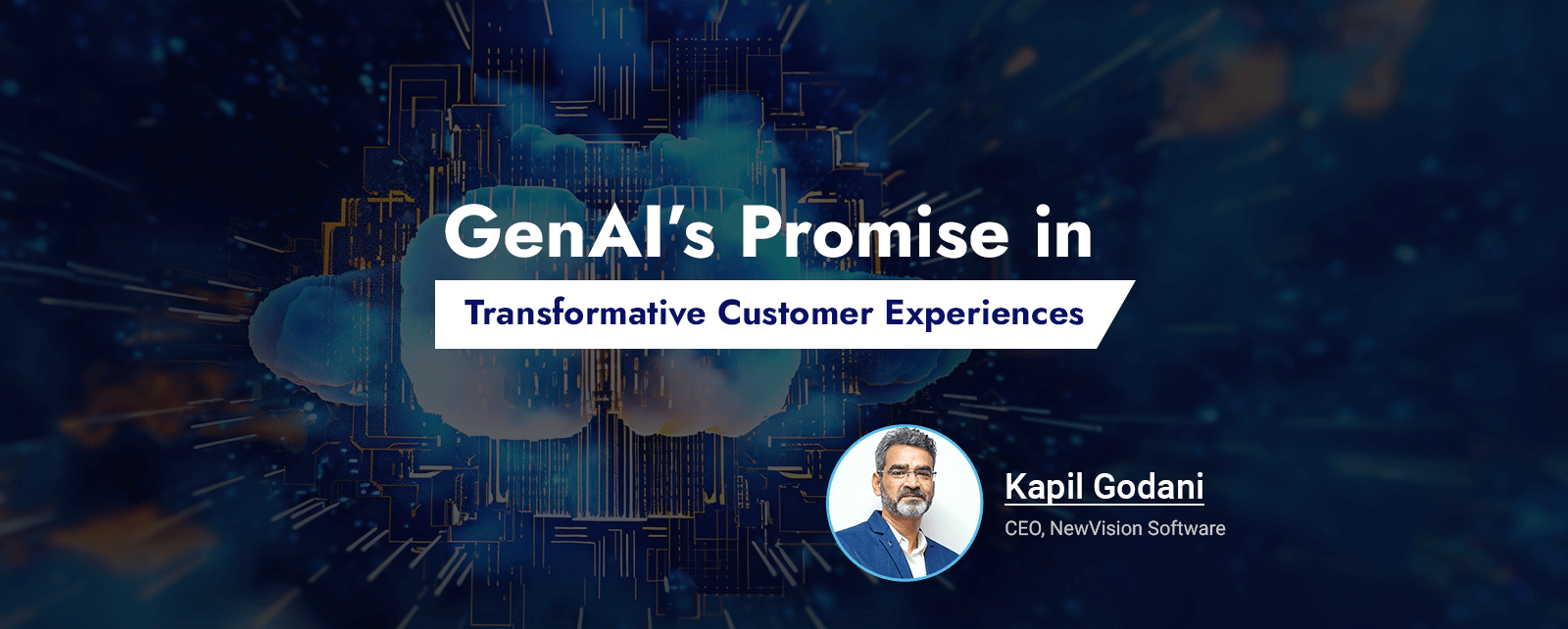
The buzz around GenAI is taking the world by storm. Specifically, GenAI is set to disrupt sales, marketing, and the customer experience (CX) in subtle and profound ways. In many ways, the direction has been set by Artificial Intelligence (AI) based applications that fetch and integrate information intelligently.
But where GenAI makes the difference is that even as it pulls up information it can also generate and provide a context. This is because GenAI tools are based on large language models (LLMs) and equipped with enhanced levels of natural language processing (NLP) capabilities. It also represents a departure from traditional AI systems in that it excels not only in pattern recognition but also in creative and generative capabilities that closely resemble human output.
GenAI’s creative prowess includes the generation of synthetic data that can replicate real-world information. These datasets are designed to be indistinguishable from human-generated data and are crucial in enhancing customer service by facilitating the development and training of AI models—a capability beyond the scope of traditional approaches.
Importantly, GenAI uses a conversational tone that makes the interaction more relatable. It takes agent empowerment to a different level as the application can create personalized content and elevate the CX. These capabilities have profound implications—by empowering to join the dots in a meaningful manner, it has plugged the gaps in harnessing AI.
Translating GenAI-powered CX into ‘Moments of Delight’
Gartner predicts that by 2025, 80% of customer service and support organizations will be applying GenAI technology in some form to improve agent productivity and CX. Another Gartner poll finds that 38% of leaders want to improve CX and retention with GenAI applications.
Over time, GenAI will blend within the customer service organization seamlessly assisting agents by taking over repetitive tasks; summarizing customer information from multiple channels; providing context with sentiment analysis, and many such activities. GenAI-enabled systems will move from providing updates and information to bridging the gap between the digital and human realms. According to BCG, GenAI-enabled customer applications will initially assist human agents, and eventually, bots will become as good as human agents.
Customer reps will be empowered to answer more complex queries with accurate responses based on real and synthetic data. For instance, if a traveler has a botched reservation during a vacation, GenAI will assist with insights into the customer journey, gaps in the reservation, insights into current rates, customer preference, and comparative rates with new reservations, while also throwing up data about different loyalty programs—all on a single screen empowering the agent to kickstart an informed conversation on an empathetic note.
In effect, bots will execute the tedious work allowing agents to focus on establishing a human connection during a moment of crisis. At the same time, GenAI’s capacity to analyze customer sentiment and predict churn will assist representatives in proactively addressing issues with offers and outreach programs.
As systems mature empowered bots will become indistinguishable from humans assisting customers with most queries, transitioning from reactive to proactively solving problems by directly reaching out to customers with preventive solutions.
Eventually, GenAI-enabled support will be customized to act as a personal assistant of individual customers who fully understand the relationship with the company, anticipate needs, and interact with other systems to get a complete picture of the customer life cycle.
Getting the Next Steps Right is Vital
Companies are fervently experimenting with use cases to identify the correct ones. This is a crucial step in training the model on business-specific data. Use cases with the highest ROI are ideal to start with and empower agents with context around the customer, product, and interaction, as well as guidance on how to best solve the customer’s issue. Research finds that a connected agent strategy improves contact center efficiency by 30%, and reduces attrition.
While GenAI is good to act as an assistant, it is still not mature enough to demonstrate human-like agency. Businesses will take time to figure out the right use cases, correct model, the ROI and align it with the overall strategy. Yet the action on the ground is more important than intent and a well-formulated strategy around customer experience is the natural thing to gravitate to—it is where the biggest learning, refining, and impact happens. The unprecedented race has begun and a thoughtful strategy that encompasses design, strategic alignment, workforce collaboration, and synthetic data will empower organizations to achieve GenAI-enabled CX transformation.


